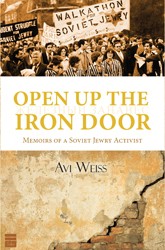Like a Drop of Ink in a Downpour: Memories of Soviet Russia traces Yelena Lembersky’s childhood in Leningrad (Saint Petersburg) in the 1970s and ‘80s. Her life is upended when her family decides to emigrate to America, but instead her mother is charged with a crime and unjustly incarcerated.
Told in the dual points of view, this memoir is a clear-eyed look at the reality of life in the Soviet Union during the Cold War, giving us an insider’s perspective on the roots of contemporary Russia. It is also a coming-of age story, heartfelt and funny, a testament to the unbreakable bond between mothers and daughters, and the healing power of art.

Like a Drop of Ink in a Downpour: Memories of Soviet Russia
Discussion Questions
As historical distance grows between the Refusenik period of the 1970s and ’80s and today, stories of courage and resilience become all the more important to be told and remembered. Like a Drop of Ink in a Downpour is a searing and intimate memoir of the experience of three generations of women in Soviet Russia – grandmother, mother, and daughter – two women and a child whose lives were brutalized by a political system that was both cruel and arbitrary.
Told in the alternating voices of mother and daughter, Galina and Yelena Lembersky, their story also provides a sweeping overview of daily life in Soviet Russia and the pervasive corruption of the hierarchy that reached down to the individual and dictated where they lived, what they ate, and how they should think.
When the family applied to emigrate in 1980, Galina was charged with an “economic crime” and imprisoned; her eleven-year-old child, Yelena, was rescued by an acquaintance. The memoir presents Yelena’s vividly painted recollections of her childhood with the two women she deeply loves— her mother and grandmother— her palette darkening with fears for her mother thousands of miles away in the Soviet gulag and her grief over their separation.
While Yelena paints word pictures, Galina offers poetry. Describing her prison existence as “between hope and hopelessness,” she nonetheless remains a devoted mother, advising, instructing, and encouraging her daughter through her moving, lyrical letters and poems.
One of the few English language memoirs composed by women about life as refuseniks in Soviet Russia, Like a Drop of Ink in a Downpour is a significant, beautifully written addition to this body of literature. It is all the more resonant today with Russia’s war on Ukraine.

Help support the Jewish Book Council.



